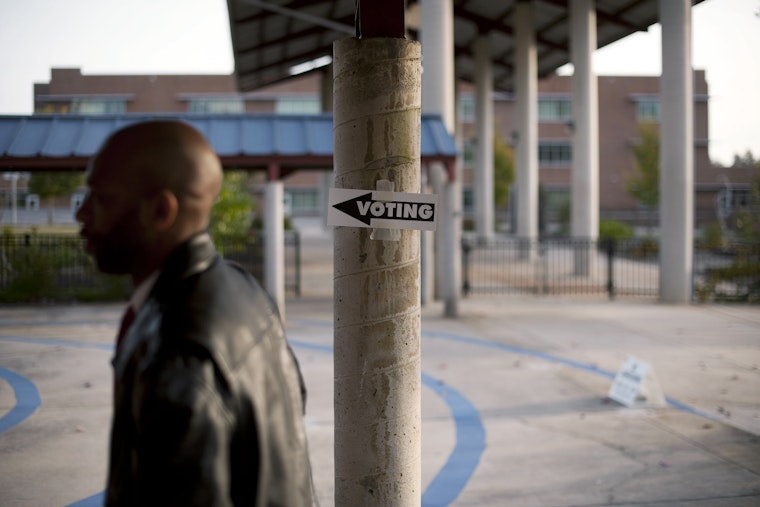Making Legal History in the Fight for Fairer Redistricting
By Allison Riggs

January 9 dawned as another anxious day. I work at the Southern Coalition for Social Justice in Durham, North Carolina, working to dismantle structural racism and promote the rights of the historically disenfranchised, and these days my team of attorneys is on overdrive. The North Carolina legislature is in special session, and we just wrapped up a big hearing in federal court. We’ve been on a dead run since Christmas.
But late Tuesday, we got word that caused a spontaneous celebration in our office. A three-judge federal panel struck down North Carolina’s congressional map as an unconstitutional partisan gerrymander—the first such finding involving congressional districts in the country’s history. We don’t drink a lot, but I’ll admit it: some beers flowed as we digested the news.
The ruling caught us by surprise; the court had been expected to rule late last year, and the delay sparked speculation that the judges might be waiting on another case in the pipeline before rendering their decision. The ruling will also be appealed, and another set of cases under consideration during this session of the U.S. Supreme Court will have enormous influence in further shaping the legal landscape of redistricting. But the ruling in League of Women Voters of North Carolina v. Rucho marks a major victory with potential to influence how legislators draw the boundaries of their constituencies that could resonate far beyond North Carolina’s borders.
The Southern Coalition has been battling over North Carolina’s congressional redistricting for years now. This battle began in earnest over a map drawn in 2011, which ensured the election of 10 Republicans and three Democrats. Select districts in that map were struck down by a federal three-judge panel as racially biased, and lawmakers were ordered to draw a new one.
But the fix had the same problem, as we argued in court: it was drawn to prevent non-Republican voters—in this case, often Black voters—from being able to meaningfully affect political outcomes, in violation of the Fourteenth and First Amendments.
This new ruling went a step farther than the 2011 judgment, arguing that the new map was not just racially discriminatory, but in fact was an unconstitutional partisan gerrymander—a finding bolstered by an admission by one GOP state legislator involved in the process that his motivation was to elect more Republicans than Democrats—and that he’d make all 11 districts Republican if he could figure out how to do so.
“Partisan gerrymandering runs contrary to both the structure of the republican form of government embodied in the Constitution and fundamental individual rights preserved by the Bill of Rights,” the court wrote. It constitutes a structural violation because it “insulates [r]epresentatives from having to respond to the popular will, and instead renders them responsive to state legislatures or political factions thereof.”
With respect to the First Amendment harms, the federal court further remarked: “That partisan gerrymandering encroaches on these individual rights by undermining the right to vote—the principle vehicle through which the public secures other rights and prevents government overreach—magnifies the constitutional harm.”
We used cutting-edge social science to help persuade the court. Known as the “efficiency gap [PDF],” this technique examines the number of “wasted” votes in an election—that is, those for the losing candidates, as well as those votes for the winner above the number needed to secure victory. This helps determine whether either party has a systemic advantage in the drive to convert votes into congressional seats.
This relatively new science helped provide the federal judges in our case something that the U.S. Supreme Court has said it is lacking in evaluating other recent redistricting cases: a clear standard for measuring just how much a map skews to the advantage of one party or the other.
The high court has heard one case on partisan gerrymandering this term (Wisconsin), and is set to hear another case in Maryland later this term. We are hopeful that the three-judge panel’s findings in the North Carolina case—and the use of the efficiency gap—will figure into their deliberations.
The facts in North Carolina—where state legislators brazenly admitted that what they were drawing was a partisan gerrymander—are far more egregious than the facts in either Wisconsin or Maryland. It is possible that the North Carolina case could be reviewed on an expedited basis and decided with the other two cases.
The Southern Coalition is confident that the standard we offered the trial court, which it plainly found easily manageable, is one that Justice Anthony Kennedy could embrace. The Supreme Court could also just let the North Carolina decision stand, because the trial court was clear that this was an unconstitutional partisan gerrymander no matter what standard was used.
However the high court proceeds, it seems increasingly likely that the justices will be forced to act to rein in the widespread partisan gerrymandering that undermines our democratic system and abridges the ability of voters to hold their representatives accountable. And in the South, where the Southern Strategy so effectively made the Republican Party white and the Democratic Party the party with which people of color associate, a rule from the Supreme Court limiting partisan gerrymandering will provide huge benefits to voters of color.
Maybe there will be occasion for us to pop open a few beers again this spring.
The Southern Coalition for Social Justice is a grantee of the Open Society Foundations.
Editor’s note (January 19, 2018): The Supreme Court on January 18 issued a stay in the North Carolina case, placing further action on the state’s map on hold as it considers other redistricting cases this term.
Allison Riggs is senior attorney with the Southern Coalition for Social Justice.


